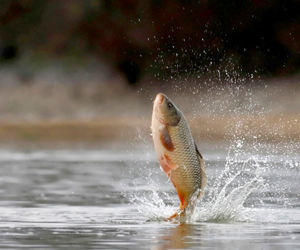Federal court denies states’ request for preliminary injunction
to halt invasive Asian carp
The Seventh Circuit Court of Appeals says federal and state governments
are currently doing enough to address the advancement of invasive Asian
carp towards Lake Michigan from the Mississippi River, and more drastic
measures are not necessary at this time.
By Joe Forward, Legal Writer,
State Bar of Wisconsin
 Aug. 30, 2011 – Noting that federal and state agencies are already
mounting efforts to halt the migration of invasive Asian carp into Lake
Michigan, the U.S. Court of Appeals for the Seventh Circuit
recently rejected Wisconsin and other states’ request for a
preliminary injunction.
Aug. 30, 2011 – Noting that federal and state agencies are already
mounting efforts to halt the migration of invasive Asian carp into Lake
Michigan, the U.S. Court of Appeals for the Seventh Circuit
recently rejected Wisconsin and other states’ request for a
preliminary injunction.
Wisconsin, Michigan, Minnesota, Ohio, and Pennsylvania sued the U.S. Army Corps (Corps) of Engineers and the
Metropolitan Water Reclamation District of Greater Chicago (District)
– which together own and operate the Chicago Area Waterway System
(CAWS) – alleging the Corps and the District are not doing enough
to prevent invasive carp from moving into the Great Lakes.
Failure to take more action, like imposing physical barriers throughout
the CAWS, threatens public welfare in violation of the federal common
law of public nuisance, the states argued. The preliminary injunction
would require the Corps and the District to take certain measures before
a trial on the merits.
The district court had denied the states’ request for a
preliminary injunction, concluding that the problem had not yet advanced
to present an immediate threat. The states immediately appealed.
But in State
of Michigan et. al. v. U.S. Army Corps of
Engineers, et. al.,
No. 10-3891 (Aug. 24, 2011), a three-judge panel ruled that given
current measures in place to protect the Great Lakes from invasive carp,
the substantial costs involved in granting a preliminary injunction are
not warranted.
“In our view, the plaintiffs presented enough evidence at this
preliminary stage of the case to establish a good or perhaps substantial
likelihood of harm – that is, a non-trivial chance that the carp
will invade Lake Michigan in numbers great enough to constitute a public
nuisance,” wrote Judge Diane Wood.
“If the invasion comes to pass, there is little doubt that the
harm to the plaintiff states would be irreparable. That does not mean,
however, that they are automatically entitled to injunctive relief.”
The appeals panel explained that state and federal governments have
already mounted full scale efforts to stop advancement of invasive Asian
carp from the Mississippi River, and “this effort diminishes any
role that equitable relief would otherwise play.”
For instance, the panel noted the existence of the Aquatic Nuisance
Species Task Force and the Asian Carp Regional Coordinating Committee
(ACRCC), which is designed to stop the migration
of invasive carp. ACRCC has facilitated, among other measures,
establishment of electronic barriers to keep fish out of the CAWS, a
system of cannels, waterways, locks and dams.
The states asked the court to authorize the temporarily closing of
locks, the installation of screens over gates that control water flow,
the use of block nets to stop fish migration, the use of rotenone to
poison fish, and the acceleration of studies aimed at stopping Asian
carp migration.
Before ruling in favor of the defendants, the panel examined the harm
that instituting such measures would place on the defendants, primarily
the U.S. Army Corps of Engineers and the City of
Chicago.
“This overview demonstrates that the preliminary injunction the
states have requested would impose substantial costs, yet given the
state of the current record, we are not convinced that the preliminary
injunction would ensure much of a reduction in risk of the invasive carp
establishing themselves in Lake Michigan in the near future,”
Judge Wood wrote.
However, the panel noted the new evidence could come to light that
could require more drastic action to prevent the advancement of Asian
carp into Lake Michigan, and the district court would have the authority
to revisit the question of whether a preliminary injunction is
warranted.
